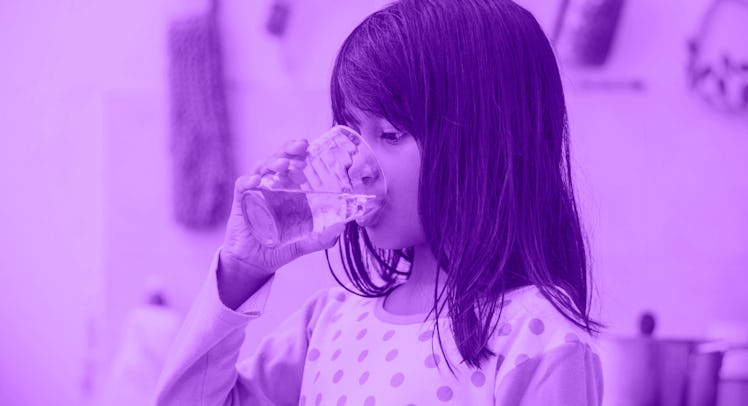4 Myths About Kids Drinking Water that Parents Should Flush Out of Their Systems
Babies don’t need water to stay hydrated and kids don’t need sports drinks, but they do need tap water and some encouragement to stay hydrated.

Hydration is a watchword in the wellness industry, as health gurus push people to down more and more water. But as water continues to dominate adult conversations the purported health benefits of hydration are increasingly leveled at kids. And while children do need to stay hydrated, their needs are very specific—and usually at odds with the latest health fad. When they need it, how much they need and where it should come from are all ripe for debunking.
Here are four water drinking myths that parents need to flush out of their systems:
Myth #1: Babies Need Water in Order to be Hydrated
The “drink more water” hydration-fad is most dangerous for babies. It would seem completely reasonable for parents of a baby to conflate the benefits of water on a hot day for adults, with a benefit for their kid. But a baby that drinks water could be at risk of seizures and even death.
Babies are designed to get the sum total of their hydration from their mothers (with a minuscule amount additional water from food when they start gumming solids). Barring breastmilk, the amount of water added to formula is a specific ratio that is safe for a baby.
Giving a baby additional water can essentially flood their system and throw their electrolytes out of balance. Specific levels of potassium and sodium are crucial for a baby’s nervous system to function properly and excess dilution can cause disorientation, seizures, and even death. As a rule, pediatricians recommend that babies do not drink water until they are 12 months old.
Myth #2: Bottled Water is Better for Kids Than Tap
With the lead crisis in Flint on everyone’s minds, it makes some sense that children should stick to bottled water. And, in cases where lead is present in tap water, that is exactly right. But studies suggest the risk of lead exposure in tap water is minuscule, and drinking bottled water exclusively means that kids miss out on the dental benefits of municipal water fluoridation. Besides, studies suggest the water stored inside bottles contains microplastic particles and it is not yet clear whether ingesting small bits of plastic poses a long-term health concern.
Unless you live in Flint, a cold glass of tap water might be your safest bet.
Myth #3: Juice Is Just As Good As Water
While juice and sports drinks can quench a kid’s thirst, they both have something that good old plain water does not have: additional calories from sugar. And with the obesity epidemic still in full swing, the American Association of Pediatrics is recommending that parents keep their kids far away from the juice boxes and sports drinks. Besides, unless your child is a high-level athlete sweating hard for hours on end, there is really little benefit to additional electrolytes in the average sports drinks. Water will do the job, and without all the stuff that can make your kid fat.
Myth #4: Kids Just Don’t Like to Drink Water
It’s not that kids think water is boring and awful, it’s that they’ve been exposed to sweet drinks that jack directly into their reward system. The fact is, if a kid develops a water habit, they will drink it when they are thirsty. The job of the parent, then, is to help kids develop that habit.
It’s best to start kids on water as soon as they’re able to start drinking it, about a year after birth. If they develop the habit to quench their thirst with water before birthday parties and school lunches introduce them to the sweet stuff, they should be good to go. And while water itself doesn’t have a lot of zing, that doesn’t mean drinking it needs to be dull. Try putting water in fun colored cups, and offering straws with crazy shapes. Kids have surprisingly simple tastes.
One of those tastes should be water.